Cyrus Poonawalla, India’s eighth richest man, loves his Thoroughbreds.
Every morning, the 74-year-old patriarch of the Poonawalla group, visits his stables at the family-owned stud farm before attending to his other concern: Serum Institute of India, Asia’s largest vaccine maker and the world’s second largest in terms of doses manufactured and sold.
Serum, a company that Poonawalla founded as a 25-year-old, may soon be at the centre of India’s largest private equity deal, according to Bloomberg. The vaccine maker—whose products include Nasovac-S, Poliovac and Tresivac—plans to sell a 10% stake in the privately held company, which is being valued at some $12 billion.
“This would be just capturing the crazy valuations right now that information technology companies and pharmaceutical companies are getting,” Adar Poonawalla, Serum’s CEO and Cyrus Poonawalla’s son, told Bloomberg. “Looking at all this, we decided: why not unlock some value if the valuations are good?”
Not that the family is strapped for cash. Last week, the Poonawallas coughed up Rs750 crore ($113 million) to buy a former US consulate building in Mumbai, considered India’s most expensive residential purchase.
The funds raised are to be used for philanthropic work, including setting up educational institutes and hospitals. Serum is yet to respond to an interview request from Quartz.
The Thoroughbreds
Poonawalla started Serum in 1966 with an investment of $12,000 because he wanted to diversify away from horse breeding. The Poonawalla’s family owns India’s largest stud farm—the Poonawalla Stud Farms—that was set up in 1946. Their horses have so far won 342 classics, a world record.
It was a chance meeting with a veterinary doctor that led Poonawalla into vaccines. “At the time, the farm’s retired horses were donated to government-owned Haffkine Institute in Mumbai, which made vaccines from horse serum,” his personal website notes. Poonawalla soon decided to extract the serum from horses and produce vaccines on a mass scale. Horse serum is used for creating vaccines for diphtheria, tetanus and scarlet fever.
So, Poonawalla set up a small laboratory in one corner of his stud farm, and the company started with the production of Tetanus Antitoxin in 1967. Much of the growth in the last century came from keeping the prices of the vaccines very low, which helped the company penetrate the market without large-scale promotions or advertisements.
“The major breakthrough came in the mid-1980s when we got pre-qualified or accredited for supplying vaccines to the UN agencies. Thereafter, there was a meteoric rise for the company,” Poonawalla said in an interview to CNBC TV18 last year. “Today, we protect more children than any other big pharma (company) in the world.”
By 1998, the company’s exports grew to 100 countries and was recognised as the world’s largest producer of measles vaccine.
Last fiscal, Serum posted annual revenues of Rs3,636 crore ($553 million) and generated profits of Rs1,741 crore ($265 million). Serum’s vaccines—which also include ones for rabies, polio and measles—are being sold in some 141 countries and at least 65% of all children globally have received a Serum vaccine once, according to the company. In all, the company sells 1.3 billion doses of vaccines annually.
The big boost
The foundation of the group’s recent success was on the back of its decision to invest heavily in scaling up its production capacity during the last decade, even as the global economy was mired in a debilitating downturn.
In 2012, it bought out Dutch vaccine maker Bilthoven Biologicals—a loss-making firm run by the Netherlands government—and pumped in 70 million euros ($78 million) over three years to increase capacity.
The Bilhoven acquisition gave Serum access to injectable polio vaccine technology, which was then available to just three vaccine producers globally. After scaling up volumes, the company reduced prices substantially in the global market to sell polio vaccines to UNICEF for its polio eradication programme.
In an interview to CNBC TV18, Poonawalla explained:
As the world’s largest vaccine manufacturer, nobody ever dreamt that we do more than Glaxo or Merck or Sanofi. And they are a clutch of 20 companies or ten companies that have been merged, whereas we are a company that started as a small scale company without any government support. And, that I would consider would be a major milestone in my career, at the cost of huge profits that we have sacrificed by keeping the prices very affordable, the lowest in the world.
The company’s current portfolio includes vaccines for influenza, measles, tetanus, diphtheria, hepatitis-B and snake antivenom. It is also in the midst of a Rs1,000 crore expansion plan to set up a new manufacturing facility in Pune.
In November 2014, Serum also signed a deal with Cipla, a homegrown pharmaceutical company, for marketing Serum’s paediatric vaccines to the global market, prompting talks of an impending merger between the two companies. In May, Cipla and Serum signed another deal where the former will market Serum’s influenza drug in India. For now, the Poonawallas have dismissed the merger talks.
“Both companies are growing very well on their own. We really have to evaluate if it makes any sense,” Adar Poonawalla told Bloomberg about a merger with Cipla. “Anything is possible in the future.”
